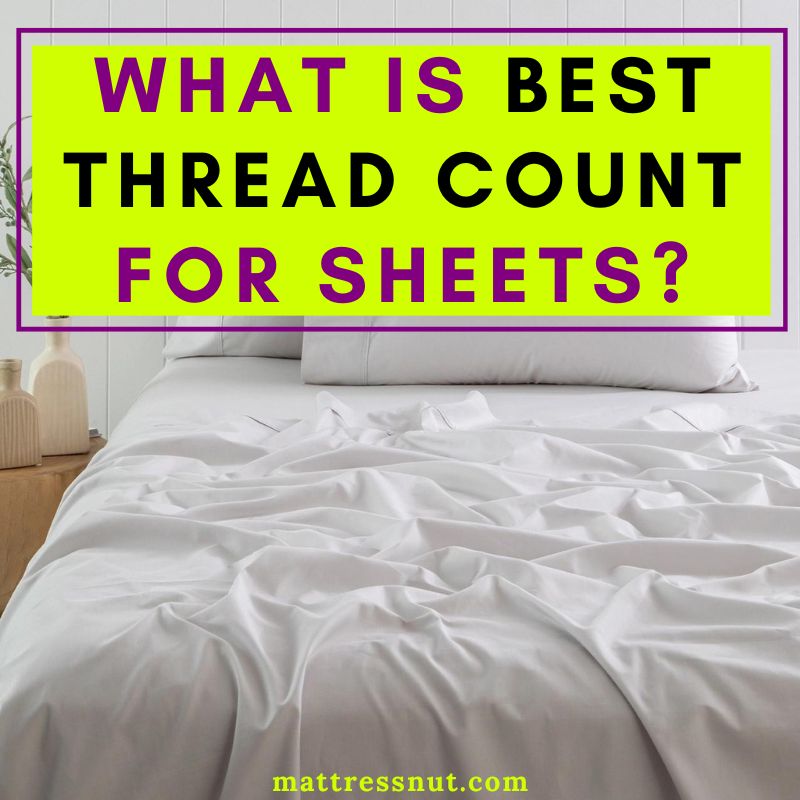When searching for the best sheets, you must have seen tread count in the description. You must be wondering what is a thread count? Well, we might have answers for you.
A higher thread count doesn’t mean the sheet is of top-notch quality. Many factors contribute to the softness and reliability of a bed sheet.
Here you’ll find all you need to know about the thread count for bed sheets.
How to Calculate Thread Count?
If we put it in simpler words, thread count is the vertical and horizontal threads per inch used in a cloth or sheet. It is a baseline designed by the industry people. It is used to measure the coarsement of a fabric or material of the sheet. The thread count gives a soft or rough texture to a cloth. It doesn’t mean high thread counts will provide you with high-quality sheets and lower thread count sheet is inferior. It depends on many features.
- The construction of fabric
- The content of the fabric
A sheet can be made of threads with single-ply or multi-ply. The cotton bed sheets made of single-ply are of the finest quality. This is because only one type of thread is used to make a single sheet. The multi-ply sheets are denser. They are made by twisting two or three threads of low quality into a single thread. They are usually not breathable and fail to absorb sweat. The single-ply sheets last much longer than the multi-ply sheets.
A bigger or lesser thread count also depends upon the content of your sheet. The fabric of the sheet can be of many types. The most famous and comfortable are the cotton sheets. The other materials include polyester, silk, and linen.

Is a higher thread count better?
This is not a necessity. Don’t think a higher thread count will give you a quality sheet. The fiber construction and the content are necessary when looking for a sheet. The thread quality matters most than the thread count.
A sheet of high quality with a low thread count is much better. You will observe that some manufacturers trick their consumers by showing a high thread count. They use multi-ply threads, which are mostly of low quality.
It shows a high thread count, but the quality you receive is poor. Make sure you see the fabric and thread composition before buying a bed sheet.
The Evolution of Thread Count: From Luxury to Necessity
The history of thread count in textiles is as intricate as the weave of the fabrics themselves. Originally, a high thread count was synonymous with luxury and was reserved for the elite. Over time, with advancements in textile manufacturing, what was once a mark of opulence became more accessible to the masses.
Today, while thread count remains a significant factor, it’s no longer the sole determinant of sheet quality. The global market has seen a shift in consumer preferences, where factors like fabric type, weave, and finishing play equally vital roles. Nevertheless, the thread count continues to be a focal point in marketing and product descriptions, leading to various myths and misconceptions.
As consumers become more informed, the emphasis is now on a holistic understanding of what makes a sheet truly comfortable and long-lasting. It’s not just about numbers; it’s about the overall experience that a sheet provides, from the moment one touches it to the night-long comfort it offers.
What’s the best thread count for sheets?
Many researchers claim that the best thread count for sheets ranges from 300 to 600. A good thread count is usually 500 in cotton sheets. You should understand that there is a restricted amount of thread that can be weaved in a square inch.
Anyone claiming more is compromising the quality of a sheet. A count less than 200 fails to give a soft texture to your sheets.
When does thread count matter?
Suppose you want soft sheets to enhance your sleeping experience; thread count matters. When buying 100% cotton bed sheets, the thread counts matter. When you buy a single-ply sheet, they use a single thread for weaving. It ensures the quality and softness of the sheet.
Many manufacturers try to fool consumers by increasing the thread count in multi-ply sheets. It gives a rough texture to the sheet, and the fibers come out of their weaves after one or two washes.
When you should totally ignore thread count
If you are buying multi-ply sheets, the thread count does not matter. The multi-ply sheet is made by twisting many threads together. It decreases the breathability of the sheet, and quality may detract.
Also, you should ignore the thread count for materials like polyester, silk, and linen. The thread count in these sheets does not guarantee high or low quality. For example, silk is naturally thin, so the sheets will probably have a low thread count. It does not mean it will not be of good quality.
Similarly, polyester blend sheets are thin and have a thread counts of thousands. It is stronger and less wrinkle-free than your cotton sheets. The manufacturers may claim high thread count to increase sales, but thread count does not matter in mixed polyester sheets.

Key factors to consider when selecting sheets
If you are going shopping to buy yourself new sheets, take into consideration some important factors.
Measurement of your mattress
Don’t forget to measure the size of your mattress before buying a sheet. You don’t want to spend money and bring home the wrong size bed sheet. Nowadays, you can get mattresses of King, queen, or even customized ones of your choice (also check the top-rated mattresses). Measure it properly, so you can cover your mattress with the pretty sheet you just bought.
Thread count
A good bed sheet that is soft and breathable is single ply. It usually has a thread count of 600ply, which means 300 threads arranged horizontal and 300 vertically.
A cotton single ply is stronger than other fabrics. It’s breathable that provides you with a comfortable night’s sleep.
Design and comfort
A bed sheet with a good design will easily uplift your mood. The bed sheet’s material must provide comfort and give you a peaceful night’s sleep. For daily use, a simple cotton sheet is a good choice. Silk sheets give your body a sensual feeling and are typically used for special occasions such as wedding nights or romantic dates.
Fitting
The fitting of your bed sheet matters a lot. Imagine a sheet not properly fixed on the bed. Find out the dimensions of your mattress and buy the sheet according to it. Some mattresses are over 12 inches high, and they require a special sheet.
Good bedding can make your whole room look beautiful and amazing.
How do I stop my sheets from pilling?
You need to be extra careful with sheets. They can lose their soft texture and become rough if not properly handled. Pilling in bed sheets occurs when the fabric breaks and tangles up. Just keep in mind a few things when washing your sheets to save them pilling.
- Never wash and dry your sheets with hot water. It can damage the fabric material, making it rough and uncomfortable.
- The bleach in sheets can affect the color of the sheet as well as weaken the threads. A soft detergent with warm water will make sheets clean and smell nice. It will also prevent them from pilling.
- Don’t expose them to direct sunlight when drying. It will cause the color to fade and weaken the threads
- Don’t buy multi-ply sheets, as they are more prone to the pilling of sheets.
Conclusion
A good bed sheet means a good sleeping experience. When you are out for sheet shopping, take into consideration the above factors. Just don’t buy your sheet based on thread count. The cotton sheets are the most comfortable sheets for everyday use.
A sheet with single-ply and a thread counts from 200 to 600 is the best choice for you. It will make your bed, soft and warm. In addition to that, they are really easy to wash and dry. The thread count in polyester, silk, and linen doesn’t matter a lot.
Before buying, take a look at a sheet’s design, fabric, and thread count. The better choice you make, the more quality sheet you will buy.
Thread count for sheets FAQs
What is the highest thread count?
The highest thread count you can get in a sheet is 1000. This high thread count does not ensure quality in sheets. Don't buy anything higher than this, as you will only get a sheet of mediocre quality. You can easily get good-quality sheets in different fabrics with a thread count of 600.
Most manufacturers use multi-ply threads to increase the thread count. They are usually inferior in quality and wear out quickly. In sheets like silk and polyester, the count may even increase from 1000. It has nothing to do with quality.
Why do my bed sheets shrink?
The main cause due to which sheets may shrink is overheating. Prolonged exposure to sunlight or a high setting in the dryer may cause the sheet to shrink or lose its shape. It will also affect the reliability of the thread, causing them to break. Take the sheet out from the machine as soon as the timer beeps. Also, one hour in the sunlight is enough for the sheets to be dried and stored away.

